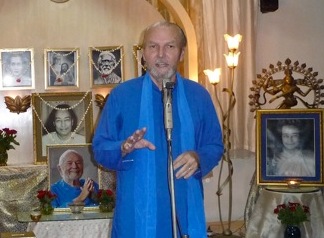When Sadhana Devi and I first moved to India in 2006, we were asked to lead a class series on the "The Art and Science of Raja Yoga." In an early class, we addressed the topic of "ahimsa", non-violence, and discussed how this is not simply an outward behavior,
a la Mahatma Gandhi or Martin Luther King, but an attitude to be extended to our thoughts and emotions. Non-violence, rightly practiced, also implies a positive cultivation of "universal benevolence." The students listened attentively and toward the end, I asked for comments and questions. That's when things became interesting. We had tried to create a trusting environment that allowed for a free exchange of thoughts and as a consequence, they were eager to share stories. The underlying theme was anger.
The students, many of them young, shared of past abuse and sincerely wanted to know how to respond to both their situation and their feelings of frustration at not being able to express what they felt. How could they possibly be non-violent in thought they wanted to know after being treated badly. Was it was even right to be no speak up or retaliate? Story after story was told of being trained parents and teachers to suppress their feelings or submit, of being mistreated by those who held positions above them, and of being powerless to do anything about it. They had come to view the word of "ahimsa" not as a tool of strength but rather as a dictum to accept the status quo of hierarchy, prejudice, power abuse, or acts of petty tyranny. "Why shouldn't we be angry," they asked, when people were acting so badly toward them or others? I learned that "ahimsa" can be a loaded word for the younger generation in India, but at the same time, I was encouraged to see their hunger for change. Non violence in a spirit of love is a weapon of the strong and brings lasting change as opposed to a temporary reshuffling of the cards.
Calm "centeredness" is an quality admire. I see it in the natural dignity of Indians but I've also noticed anger too, the fruit of frustrated desires and inhibitions. How can we help people find practical solutions to answer their need? It was with this thought that I wrote the following blog entry.
Anger
Years ago, in a moment of frustration, I spoke very harshly to a
co-worker. To my horror, she broke into tears under the weight of my
assault and I still remember my feelings of regret and deep dismay at my
inability to control myself. I had been shooting bullets of disharmony
into a crowd of innocents.
I see so much anger these days and wonder why. Is it really on the
rise or am I simply more sensitive to it now? Maybe people feel less
inhibited expressing it openly whereas before it was repressed. I don’t
know the answer but I feel sure anger is a spiritual disease that leads
us to tremendous unhappiness, within and without. Life turns away from
the angry person and consigns him to a world of darkness.
In all my years in the company of Swami Kriyananda, I can honestly
say I never saw him angry. There were times he was exasperated at
someone’s folly, but never angry or knocked off his “center.” Many
times he said, “I’ve resolved to never let anyone or anything steal my
peace” and lived his life that way. A thief is what anger is, taking
from us those things we most want in life: harmony, friendship,
clarity, and joy. All are sacrificed when we leave our heart open for
anger to enter.
Some might say, “I have a right to be angry because of what was done
to me. Wouldn’t you too be angry in such circumstances?” I can’t say
until tested, but I do know that just as happiness is a choice and not
the fruit of circumstances, so too is anger. Why choose it when it
drives away what we really want and inevitably leads to that which we
want to be free from?
Anger, as the scriptures say, is the fruit of frustrated desires and
attachment; when we don’t get what we want, we get mad. One obvious
solution is to let go of desires, but that’s easier said than done.
Something more is needed. Swami Kriyananda wrote, “Examine your heart
for any feeling of ill will toward others. Carefully uproot any such
feeling, and plant in its stead fragrant flowers of forgiveness. Only
when your heart has been softened by universal benevolence may you hope
to become receptive to the gentle vibrations of divine love. Do not
imagine that you can win God’s love until you have developed the power
to win the love of man.
The impulse toward “universal benevolence” was Swamiji’s “secret” and
something we too can each cultivate, especially when things seem to be
going wrong. He came to Master with a personal desire for God and also
with a desire to share God’s joy with all. When God fills our heart,
where is there room for anger?
